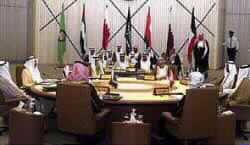Defense and foreign ministers of six pro-Western Gulf Arab states met in Saudi Arabia on Saturday for emergency talks on a possible U.S. war on neighboring Iraq. Saudi officials said Saudi Defense Minister Prince Sultan would chair the one-day ministerial meeting of the Gulf Cooperation Council (GCC), a strategic and political alliance of the United States' key allies in the oil-rich region. "There is one topic on the agenda and it is the war on Iraq and how that would affect our countries," one official said.
The GCC comprises major oil producers Saudi Arabia and Kuwait as well as Bahrain, Qatar, the United Arab Emirates and Oman. The six nations have publicly rejected a war on Iraq but they host almost all of the thousands of U.S. troops and weapons being poured into the Gulf in preparation for a possible attack.
Kuwait, Qatar and possibly Saudi Arabia are also seen as launchpads for any conflict with Iraq.
State-run Gulf news agencies said the closed meeting would convene at Prince Sultan's private palace in the Red Sea port city of Jeddah. No further details were available.
The GCC meeting follows a flurry of Arab and European diplomatic efforts to peacefully defuse the standoff with Iraq.
It also coincides with Defense Secretary Donald Rumsfeld telling a security meeting in Munich that the world would know within "days or weeks" if war was needed to rid Iraq of its alleged doomsday arms cache.
Iraq's neighbors -- Syria, Saudi Arabia and Turkey -- and other Arab states fear that a war that would topple Iraqi President Saddam Hussein would fragment Iraq into rival Sunni Muslim, Shi'ite Muslim and Kurdish enclaves and heighten instability in the Middle East.
This week, Saudi Foreign Minister Saud al-Faisal said his country had proposed to the United Nations granting amnesty to a group of Saddam's generals to encourage them to topple him and avert a war.
Key Developments Concerning Iraq
_Chief U.N. weapons inspectors Hans Blix and Mohamed ElBaradei arrived in Baghdad for new talks to demand more concessions from Iraq and evidence on leftover Iraqi weapons. "We are really making no predictions at all" about the talks in Baghdad, Blix told reporters Saturday.
_ The U.S. State Department, in an advisory Friday, advised all but essential U.S. diplomats, along with family members, to leave Israel, Jordan, Syria and Lebanon as tensions with Iraq mount. The advisory also cautioned private citizens to leave those countries and not to travel to Israel.
_ Three more Iraqi scientists granted private interviews to U.N. weapons inspectors Friday, the Iraqi Foreign Ministry said.
The U.N. had no immediate comment. Earlier, U.N. nuclear weapons inspector Mohamed ElBaradei said Iraq must make "quick progress" in cooperating with arms monitors "because time is critical."
PHOTO CAPTION
Defense and foreign ministers of six pro-Western Gulf Arab states met in Saudi Arabia on Saturday for emergency talks on a possible U.S. war on neighboring Iraq. Photo shows GCC ministers meeting in Riyadh, March 11, 2002.
- Author:
AP - Section:
WORLD HEADLINES


 Home
Home Discover Islam
Discover Islam Quran Recitations
Quran Recitations Lectures
Lectures
 Fatwa
Fatwa Articles
Articles Fiqh
Fiqh E-Books
E-Books Boys & Girls
Boys & Girls  Women
Women










